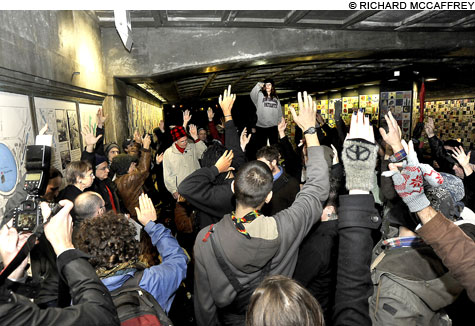
WHAT DEMOCRACY LOOKS LIKE Occupy Providence votes to leave Burnside Park if the city opens a daytime shelter for the homeless. |
It was only a week ago that members of Occupy Providence huddled in a pedestrian tunnel on a rainy afternoon and voted 36 to 11 to leave Burnside Park, if and when the city opens a daytime shelter for the homeless.
But it had been clear, for some time, that the movement was in a transitional moment.
The park, itself, had become a drag on Occupy: the weather was turning frigid; Occupyers were getting ill; and the press seemed more interested in the never-ending permitting battle with the city than in the economic issues at the heart of the protest.
But there were larger forces at work, too. The Occupy movement, writ large, was shifting to a new phase: there were no more tents in Zuccotti Park in New York, no more tents in Dewey Square in Boston. The Internet was abuzz with talk of what comes next.
But if change seemed inevitable, it would be fraught.
As the assembled joined in a unity chant that evening after a long, emotionally charged debate — "Who are we? Who are we? Occupy PVD!" — a series of difficult questions loomed: Would the city accede to its demands? Could the movement survive without occupation?
And for Occupyers here and across the country, this central query: could a small band of protesters who had changed the national conversation in a matter of months — "We are the 99%" — actually change the nation?
'NERVOUS AWAKENING'
It is a couple of weeks before the vote and Occupyer Jared Paul, 33, is sipping from a hot chocolate at Small Point Café on Westminster Street, a few blocks from Burnside.
A performance artist and writer, Paul is a veteran of radical protest and he looks the part: bushy beard and mustache, piercing blue eyes.
He attended the University of Rhode Island as an undergraduate, he tells me, and immersed himself in a disturbing study of the prison system and military-industrial complex.
"I didn't have a nervous breakdown," he says. "I had a nervous awakening."
Paul has heard all the standard critiques of Occupy — it's unfocused, it's ineffective, it's moving too slowly to articulate a political program — and he has little regard for any of them.
Occupy's concerns are pretty clear, he says: economic inequality and global corporatism. And the movement's explosive growth, the loss of the parks notwithstanding, is hardly a sign of stagnation.
"We're not behind schedule," he says. "We're not dragging our feet. We're a goddamn phenomenon is what we are."
Implicit, here, is a demand for patience in sketching out a Phase II. And it is not unreasonable. Occupy is a new movement. And those who think it will fade over the winter underestimate the commitment and creativity of its core actors.
But after talking with a number of Occupyers in recent weeks, it seems clear to me that time, alone, will not yield a reinvention. The activists have not settled on a new direction, in large part, because they are content with their current one.